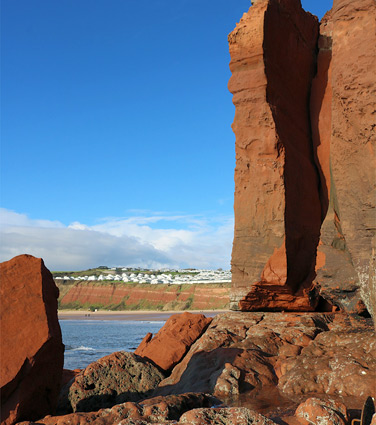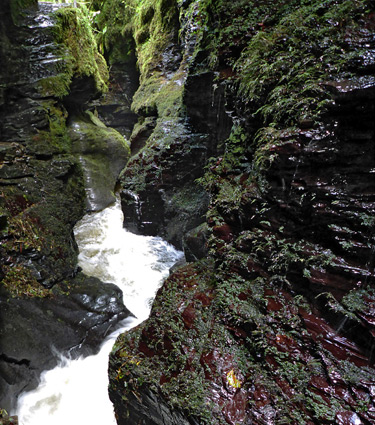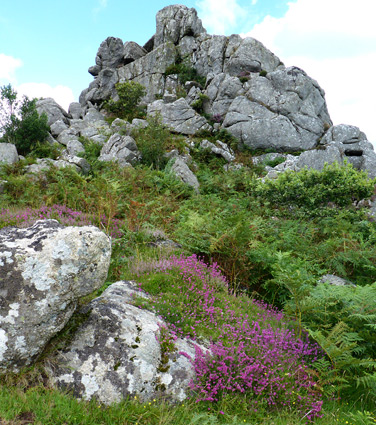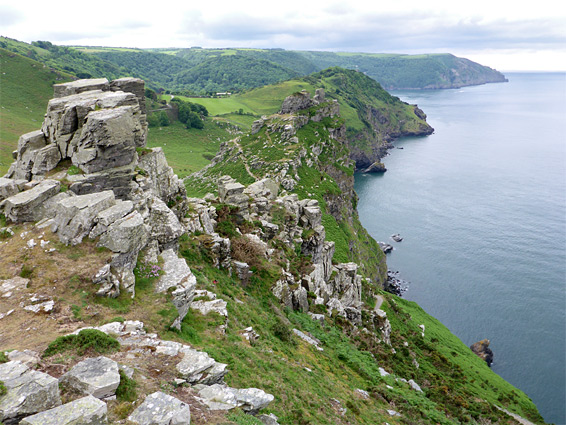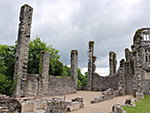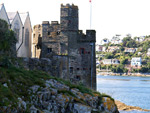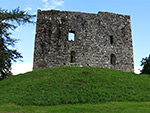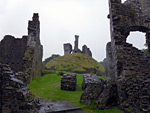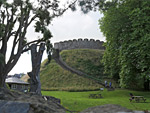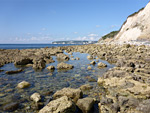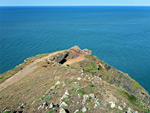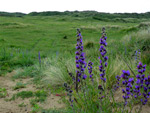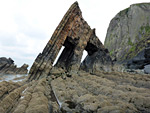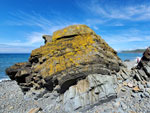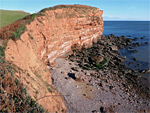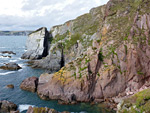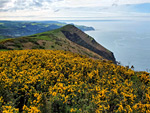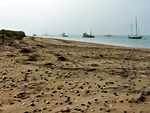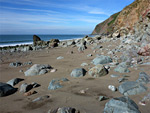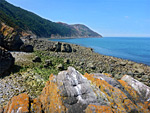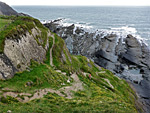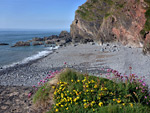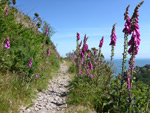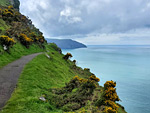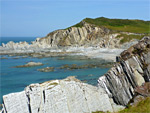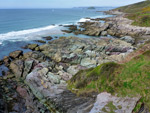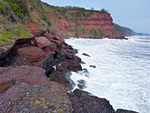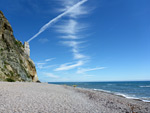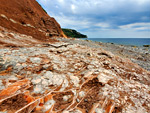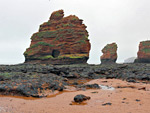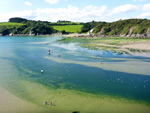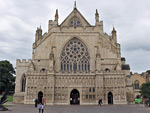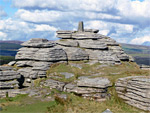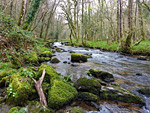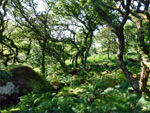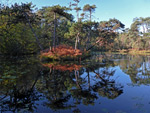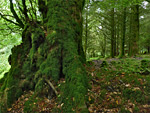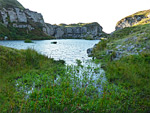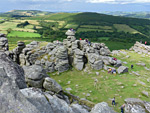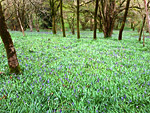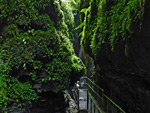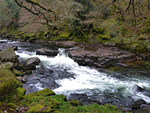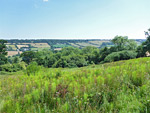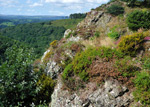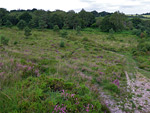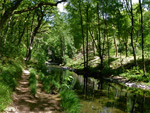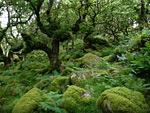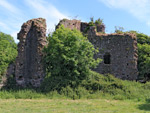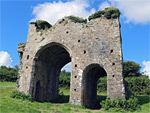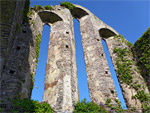Devon is renowned for its moorland and coastal scenery. The county contains all of Dartmoor National Park and about a third of Exmoor National Park, the remainder being in Somerset, which along with Dorset borders Devon to the east. Both parks are characterised by extensive, treeless uplands, dotted with weathered rocky outcrops, and abundant deposits of peat. There are no dramatic peaks, and most of the moors have low relief, so the best views are generally of the large scale landscape, but some hills are topped with photogenic rock formations; granite in Dartmoor, sedimentary in Exmoor. Many trails cross the two national parks, and a few smaller moors elsewhere in the county.
All of the Devon coast is dramatic, and similar in appearance to the north and south; mostly cliff-bound but also forming many sandy beaches and coves. The rocks are sedimentary to the south, generally tilted at a moderate angle, but more distorted to the north, and partly metamorphosed. The eastern 30 miles of the southern shoreline, beyond Exmouth, is part of the Jurassic Coast that extends across most of Dorset, and contains large exposures of fossil-bearing strata spanning 185 million years of geological history. Long stretches of both coastlines are generally accessible only from above, along the coastal path, but may also be explored at sea level, perhaps only for a few hours around low tide. Some of these regions are amongst the most scenic and little-visited parts of the whole country.
Devon contains a few, relatively minor prehistoric sites, and no major ruined abbeys, but does have a good selection of castles, and a particularly beautiful cathedral.
All of the Devon coast is dramatic, and similar in appearance to the north and south; mostly cliff-bound but also forming many sandy beaches and coves. The rocks are sedimentary to the south, generally tilted at a moderate angle, but more distorted to the north, and partly metamorphosed. The eastern 30 miles of the southern shoreline, beyond Exmouth, is part of the Jurassic Coast that extends across most of Dorset, and contains large exposures of fossil-bearing strata spanning 185 million years of geological history. Long stretches of both coastlines are generally accessible only from above, along the coastal path, but may also be explored at sea level, perhaps only for a few hours around low tide. Some of these regions are amongst the most scenic and little-visited parts of the whole country.
Devon contains a few, relatively minor prehistoric sites, and no major ruined abbeys, but does have a good selection of castles, and a particularly beautiful cathedral.
CastlesBerry Pomeroy Castle Ruins of a 15th century castle containing a Tudor manor house; a substantial and evocative site, on a limestone outcrop in a wooded, rural setting Rating: ★★★★★ |
| Dartmouth Castle Small castle, built as an artillery fort at the end of the 14th century, with a spectacular location on a rocky outcrop at the entrance to Dartmouth Harbour Rating: ★★★★★ |
| Lydford Castle Square tower/keep from the 13th century, mostly used as a prison, close to earthworks from an earlier fortification Rating: ★★★★★ |
| Okehampton Castle Photogenic ruins on a partly wooded hill above the West Okement River; once the largest castle in the county Rating: ★★★★★ |
Powderham Castle - castellated mansion, begun at the start of the 15th century |
| Tiverton Castle - medieval castle that was later transformed into a country mansion, retaining many original features; a varied and interesting place to visit. Privately owned, with limited opening |
| Totnes Castle Small but well preserved Norman motte and bailey castle, centred on a circular keep Rating: ★★★★★ |
CoastlineAxmouth to Lyme Regis Cliffs, beaches and landslips along a remote, 7 mile section of the Jurassic Coast Rating: ★★★★★ |
| Baggy Point Cliff-lined headland with some rocky terraces; interesting geology and varied wildflowers Rating: ★★★★★ |
| Braunton Burrows The second largest dune system in the UK; numerous plant and animal species Rating: ★★★★★ |
| Brownsham to Clovelly Tall cliffs, a famous village, and a wooded valley leading to Mouthmill Beach, site of Blackchurch Rock, a double arch Rating: ★★★★★ |
| Buck's Mills to Peppercombe Pebble beaches, cliffs, rock formations and two small waterfalls, below ancient woodland Rating: ★★★★★ |
| Budleigh Salterton to Ladram Bay Red-rock coastline east of the River Otter; sheer cliffs above narrow, inaccessible beaches and marine terraces Rating: ★★★★★ |
| Burgh Island Tidal, grass and wildflower-covered island opposite the wide sandy beach at Bigbury-on-Sea Rating: ★★★★★ |
| Combe Martin to Great Hangman The coast east of Combe Martin, rising to the highest seacliff in England, 1,043 foot Great Hangman Rating: ★★★★★ |
| Dawlish Warren Sandy promontory at the mouth of the River Exe containing varied habitats, home to many plant species Rating: ★★★★★ |
| Foreland Point to Lynmouth 2.5 miles of north Devon coastline, from a high headland to the mouth of the River Lyn Rating: ★★★★★ |
| Glenthorne Beach to Foreland Point Spectacular, three mile section of the north coast, with dense woodland sloping steeply down to remote beaches and eroded rock formations Rating: ★★★★★ |
| Hartland Quay to Marsland Spectacular, five mile section of the Hartland Peninsula; cliffs and steep slopes above rock, pebble and sand beaches Rating: ★★★★★ |
| Heddon's Mouth Cliff-lined pebble and sand beach at the lower end of the River Heddon, reached by an easy walk along a deep, secluded, wooded valley Rating: ★★★★★ |
| Heddon Valley to Sherrycombe Four mile section of the north Devon coast, between two deep valleys, inaccessible at sea level but followed by the coast path up to 900 feet above Rating: ★★★★★ |
| Lynmouth to Valley of Rocks Path from Lynmouth, climbing through woodland then traversing precipitous slopes to a rocky valley, with optional descent to the isolated Wringcliff Beach Rating: ★★★★★ |
| Mortehoe to Lee Bay Slate cliffs, eroded formations and secluded beaches along the northwestern part of the coast Rating: ★★★★★ |
| Noss Mayo to Stoke Down Narrow inlets, tiny beaches and grassy promontories, and much colourful, jagged, eroded rock Rating: ★★★★★ |
| Shaldon to Watcombe Three mile stretch of the east Devon coastline near Teignmouth, lined by high cliffs of red breccia Rating: ★★★★★ |
| Seaton to Branscombe Six miles of the south Devon coast; pebble and sand beaches, and rock formations, below crumbling red mudstone cliffs Rating: ★★★★★ |
| Sidmouth to Branscombe Sheer cliffs, sea caves and scenic beaches eitehr side of Beer, along the Jurassic Coast. Also many summer wildflowers Rating: ★★★★★ |
| Sidmouth to Ladram Bay Red sandstone cliffs, isolated beaches and large sea stacks; part of the Jurassic Coast Rating: ★★★★★ |
| Valley of Rocks to Woody Bay Rock formations, isolated beaches, steep cliffs and coastal woodland, west of Lynton Rating: ★★★★★ |
| Wonwell Beach to Ayrmer Cove Rugged section of the coastline, from the River Erme, eastwards, also including Fernycombe Point and Westcombe Beach Rating: ★★★★★ |
| Woody Bay to Heddon Valley Two miles of coastline, including the rocky headland of Highveer Point and the valley of Hollow Brook, which forms a tall waterfall Rating: ★★★★★ |
Cathedrals, and other major churchesExeter Cathedral Large and very beautiful 12th century cathedral, featuring fine ceiling vaulting, ancient stained glass and a variety of carvings Rating: ★★★★★ |
| Ottery St Mary Grand, cathedral-like church from the 14th century, featuring intricate vaulting, medieval tombs and an astronomical clock Rating: ★★★★★ |
LandscapesBellever Tor Large tor with much exposed, weathered granite, offering panoramic views; at the centre of Dartmoor National Park Rating: ★★★★★ |
| Blackadon Nature Reserve Ancient woodland, riverbanks, moorland and a tor, at the edge of Dartmoor Rating: ★★★★★ |
| Blackator Copse and Meldon Reservoir High elevation oak woodland in Dartmoor National Park, reached by a hike past a reservoir, returning via a tor and open moorland Rating: ★★★★★ |
| Bystock Pools Varied nature reserve with a lake, several smaller pools, heath, scrub, grassland and woodland Rating: ★★★★★ |
| Fernworthy Forest Conifer plantation, patches of heath, and several ancient monuments including a stone circle and a stone row Rating: ★★★★★ |
| Foggintor Quarry and King's Tor Abandoned granite quarry centred on a large pool, accompnanied by some ruined buildings, and a photogenic tor Rating: ★★★★★ |
| Haytor Rocks and Hound Tor Granite outcrops in Dartmoor National Park, plus a ruined medieval village and several old quarries Rating: ★★★★★ |
| Lower East Lounston Nature Reserve Small but pretty area of ancient woodland bordering a stream, near the east edge of Dartmoor Rating: ★★★★★ |
| Lydford Gorge Deep, wooded ravine along the River Lyd at the west edge of Dartmoor National Park, with several sections of dark narrows and a 90 foot waterfall Rating: ★★★★★ |
| River Dart Gorge Remote section of the River Dart between steep, wooded slopes on the east side of Dartmoor, with many pools, cascades, and some tributary waterfalls Rating: ★★★★★ |
| The Rough Nature Reserve Steeply-sloping, sometimes boggy grassland, with a good variety of wildflowers Rating: ★★★★★ |
| Teign Gorge Two mile section of the River Teign, flowing through a deep, wooded valley Rating: ★★★★★ |
| Venn Ottery Nature Reserve Heath, rough grassland and a spring-fed raised bog, home to rare plant species Rating: ★★★★★ |
| Watersmeet Confluence of Hoar Oak Water and the East Lyn River, both flowing through deep, rocky gorges with pools and cascades Rating: ★★★★★ |
| Wistman's Wood Ancient, high elevation oak woodland on a west-facing slope above the West Dart River Rating: ★★★★★ |
Ruined AbbeysCanonsleigh Abbey Small monastic remains adjoining a farm, near Burlescombe, close to the border with Somerset Rating: ★★★★★ |
| Cornworthy Priory Ruined but mostly complete gatehouse from a minor 14th century nunnery, abandoned in 1536; in a field a few miles south of Totnes Rating: ★★★★★ |
| Frithelstock Priory Picturesque ruins of the church from a 13th century Augustinian priory, in a small village south of Bideford Rating: ★★★★★ |
